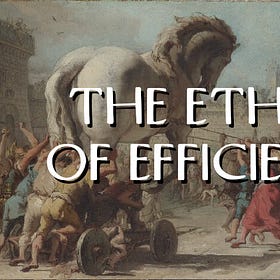Automated Shortcuts
You can't automate empathy

“One machine can do the work of fifty ordinary men. No machine can do the work of one extraordinary man.” — Elbert Hubbard, 1911
Humans will always look for shortcuts to get what we desire.
The elevator pitch, the résumé, the cost overrun, the building of the transcontinental railroad, cryptocurrency, the balloon mortgage, the subprime loan, day trading, the missile gap, the housing bubble, stonk memes, the Laffer curve, tax cuts, the Twitter blue check — all of these amount to champagne wishes and caviar dreams that can be yours too as part of a get-rich-quick scheme that promises you the moon for the low, low price of your integrity.
And so the promise of AI — more specifically ChatGPT — is clogging our newsfeeds and creative arteries as we see people attempt to get machines to do our work for them.
As ever, there are caveats…
“…whenever I chat with ChatGPT about any subject I know much about, such as the history of animation, I’m most struck by how deeply untrustworthy it is. If a rogue software engineer set out to poison our shared corpus of knowledge by generating convincing-sounding misinformation in bulk, the end result might look something like this. It’s prone to botching the chronological order of events, conflating multiple people with similar backgrounds, and—like an unprepared student—lobbing vague pronouncements that don’t require it to know anything about the topic at hand.”
These details will inevitably be worked out, but in the meantime, the cautionary tale is that this is an assistive technology, not a replacement for humans.
Not yet, anyway.
“The real problem of humanity is the following: we have Paleolithic emotions, medieval institutions, and godlike technology.” — Edward O. Wilson, 2009
Samuel Butler, writing in 1863, already saw the writing on the wall for the rise of the machines:
“There are few things of which the present generation is more justly proud than of the wonderful improvements which are daily taking place in all sorts of mechanical appliances.
…we find ourselves almost awestruck at the vast development of the mechanical world, at the gigantic strides with which it has advanced in comparison with the slow progress of the animal and vegetable kingdom.
The views of machinery which we are thus feebly indicating will suggest the solution of one of the greatest and most mysterious questions of the day. We refer to the question: what sort of creature man’s next successor in the supremacy of the earth is likely to be. We have often heard this debated, but it appears to us that we are ourselves creating our own successors.
We are daily giving them greater power and supplying by all sorts of ingenious contrivances that self-regulating, self-acting power which will be to them what intellect has been to the human race. In the course of ages, we shall find ourselves the inferior race. Inferior in power, inferior in that moral quality of self-control, we shall look up to them as the acme of all that the best and wisest man can ever dare to aim at. No evil passions, no jealousy, no avarice, no impure desires will disturb the serene might of those glorious creatures.”
While it may seem admirable to be free from the burden of vices that are invariably driven by emotion, is such a milquetoast and bland existence worthy of being called superior?
Yes, decisions might be easier when emotions aren’t running hot, but human considerations abound that may involve compassion and nuance — decisions that require a judgment call with more humanity than an algorithm provides.
Stock buybacks or a few quarters of lower profits? Hit the vehicle in front of you or the pedestrian on the sidewalk? Acknowledgement of the pain someone is enduring or a restatement of the cold, hard facts?
Dispassion produces mediocrity at scale.
“All attempts to adapt our ethical code to our situation in the technological age have failed.” — Max Born, 1968
You know what produces dispassion? The commoditization of humans — one person or a small team of people are real and relatable; 5,000 people are a statistic.
Someone sitting across the table from you is a partner in conversation; a Twitter handle is a faceless collection of bits and bytes, as inhuman as the next account (which may be a bot).
The true danger doesn’t necessarily lie in the machines; the danger lies within us and our capacity and willingness to treat other human beings with dignity.
In a recent issue of The Ruffian, Ian Leslie wrote about the struggle to be human, where machine learning is advancing, but we’re regressing:
“What I’m interested in is how humans have been laying the groundwork for bots to take over, even in areas where we are meant to be inimitable - in ideas, music, storytelling and democratic discourse. AI-generated culture and human-made culture are converging from both ends. As the machines learn how to emulate us, we are making it easier for them, by becoming more like the machines.”
It seems that as recently as last week, leaders were struggling with decisions, humanity, and AI.
Both Google and Microsoft laid off tens of thousands of employees — 12,000 from Google and 10,000 from Microsoft — all while reinforcing their commitment to machines:
Sundar Pichai, CEO of Alphabet, tried to turn the news positive, focusing on “the strength of our mission, the value of our products and services, and our early investments in AI.”
Microsoft’s CEO Satya Nadella cited a drop in advertising revenue and the need to balance long-term strategies with short-term decisions, noting “the next major wave of computing is being born with advances in AI, as we’re turning the world’s most advanced models into a new computing platform.”
At Microsoft, profit dropped 12% in the latest quarter, but that meant they only made $16.4 billion versus the $17.6 billion they made the previous quarter. And yet, they laid off 10,000 people while at the same time investing billions in OpenAI.
The machine-like decision of layoffs amid profits and large investments in (checks notes) more machines seems particularly devoid of humanity.
“I think technology really increased human ability. But technology cannot produce compassion.” — Dalai Lama
In large and complex organizations, difficult decisions are the norm. But using technology as a decision-maker or as an excuse does not absolve leaders of the need to calculate the cost to humanity.
There is no shortcut for compassion and empathy.
& More
For our Ampersand Guild (paying subscribers), below we have some additional resources to help make sense of this, including some top-notch AI writing tools, AI detection tools, a look at why college degrees in the humanities are valuable, and the next edition of the newsletter, which captures leadership lessons amid automation from an iconic movie and television show.
The Ethics of Efficiency
“I think technology really increased human ability. But technology cannot produce compassion.” — Dalai Lama What is it about technology that makes us think we’re inoculated from the errors, pains, and foibles of what it means to be human? I’m a big fan of the old




